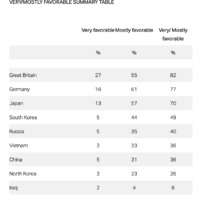Looking Back Vietnam War
Item
Title
Looking Back Vietnam War
Description
This is a survey conducted by the Gallup on November 13-15, 2000 gauging the American opinions on the Vietnam War after twenty-five years. Although it does not reflect the Americans people's opinions on the war while it was taking place, this survey provides many intriguing insights into the Americans' perspective of the war in its aftermath.
According to the Gallup, the American public still had negative opinions of Vietnam in 2000, with only 36% viewing Vietnam through a favorable lens. This number is significantly lower than other countries that the US was at war with such as Japan (70%) and Germany (77%).
Moreover, the survey reveals that time may have faded the memories of the Vietnam War for people in the current generation. At the time the survey was conducted, seventy percent of Americans acknowledged that the United States lost that war. Sixty percent correctly stated that the United States backed the South Vietnamese, while twenty percent were incorrect about the U.S. troops supporting North Vietnam.
It is also noteworthy that there was a knowledge gap about the war among young people, the generation growing up with little to no memories of the war. In details, 27% of Americans aged 18-29 said the United States backed the Northern Vietnamese government, 45% said they sided with the South Vietnamese, and 28% had no opinion. Meanwhile, Americans over the age of 30, who likely remembered the war from watching television coverage, were able to answer correctly about the United States providing support for the South Vietnamese government.
This survey indicates three crucial keys. First, the American people still viewed Vietnam in a negative light after twenty-five years, whether due to patriotism during the war or general lack of interest in the country. Second, the younger generations were less likely to know about or remember the war compared to the older ones who grew up watching news coverage of the war. Last but not least is the impact of journalism in shaping the American public understanding. While this survey does not directly mention it, it appears that television coverage of the war was a major reason why the Americans who lived and grew up during the war could still remember it. Therefore, the war journalism did not only bring the news from the front line to the Americans at home but also allowed the war to live in people's memories.
According to the Gallup, the American public still had negative opinions of Vietnam in 2000, with only 36% viewing Vietnam through a favorable lens. This number is significantly lower than other countries that the US was at war with such as Japan (70%) and Germany (77%).
Moreover, the survey reveals that time may have faded the memories of the Vietnam War for people in the current generation. At the time the survey was conducted, seventy percent of Americans acknowledged that the United States lost that war. Sixty percent correctly stated that the United States backed the South Vietnamese, while twenty percent were incorrect about the U.S. troops supporting North Vietnam.
It is also noteworthy that there was a knowledge gap about the war among young people, the generation growing up with little to no memories of the war. In details, 27% of Americans aged 18-29 said the United States backed the Northern Vietnamese government, 45% said they sided with the South Vietnamese, and 28% had no opinion. Meanwhile, Americans over the age of 30, who likely remembered the war from watching television coverage, were able to answer correctly about the United States providing support for the South Vietnamese government.
This survey indicates three crucial keys. First, the American people still viewed Vietnam in a negative light after twenty-five years, whether due to patriotism during the war or general lack of interest in the country. Second, the younger generations were less likely to know about or remember the war compared to the older ones who grew up watching news coverage of the war. Last but not least is the impact of journalism in shaping the American public understanding. While this survey does not directly mention it, it appears that television coverage of the war was a major reason why the Americans who lived and grew up during the war could still remember it. Therefore, the war journalism did not only bring the news from the front line to the Americans at home but also allowed the war to live in people's memories.
Creator
Mark Gillespie
Date
November 17, 2000
Place
United States of America
Type
Survey
Source
https://news.gallup.com/poll/2299/americans-look-back-vietnam-war.aspx
Publisher
Gallup
Rights
Copyright © 2024 Gallup, Inc.
Format
Online article
Contributor
Connie Tran
